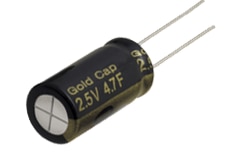Hello!
For clarity I have asked manufacturer's support if there is something than end user can do to restore hybrid capacitors that have arrived short-curcuited and they stated that "altrough there may be methods to regenerate them, it is typically not advisable to do it for commercial or safety reasons" and risk of failure or reduced performance can be high and it is usually safer and more reliable to replace them.
So I understand that the case is not hopeless but the manufacturer is not advising it for serious use cases

